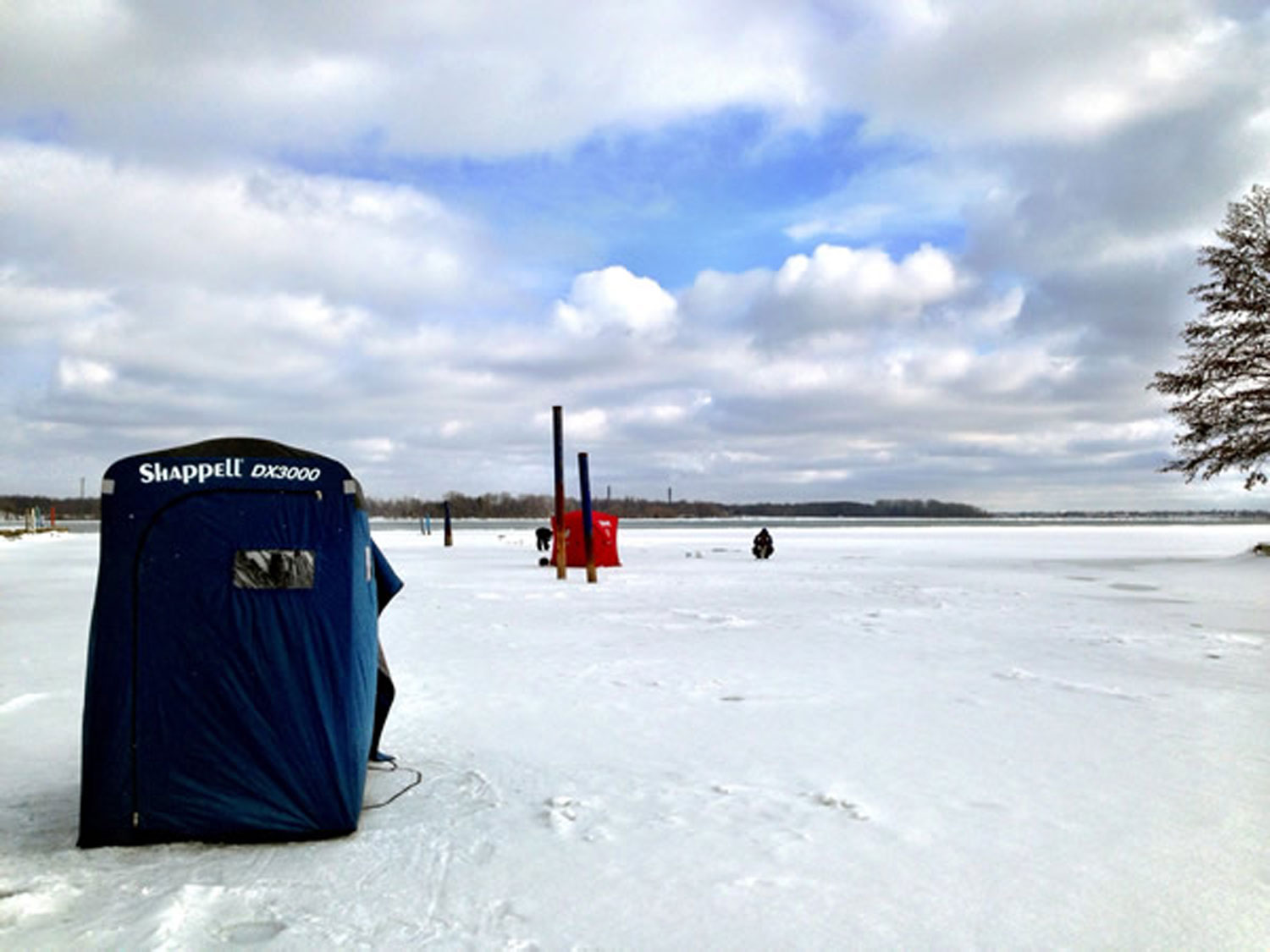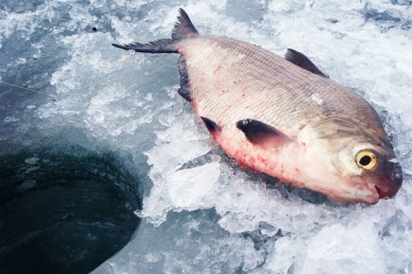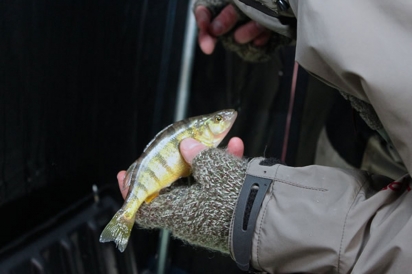Ice Fishing: The Thrill of the Catch
Joe Montgomery hasn't missed an ice-fishing season in eighty-six years. And if predictions for this winter on Lake Erie hold true, his record will soon stretch to eighty-seven.
It's late November when I speak with him and the snowfalls and temperatures mimic those of mid-January, suggesting winter is growing impatient for its turn. Montgomery, 92, is holding court at Fishin' Niagara, a Fort Erie bait, tackle and fishing-excursions shop that overlooks the juncture of Lake Erie and the Niagara River. He smiles and nods as owner Denis Kreze mentions hearing news reports predicting the earliest freezing of the lake in recent memory. Following last winter with more than 90 per cent ice cover on the Great Lakes—the second highest in recorded history—the two seem almost giddy at the prospect of another banner year for cold-loving anglers. They don't often happen back-to-back, particularly in these parts.
“I can't wait until the ice forms,” Montgomery says as the waterway behind him begins its steady and purposeful march toward Niagara Falls.
“It's hard to explain, to be sitting there at night on a chair or a bench watching the tip [of your jigging stick] stay up. You can wait for an hour, then decide to go make a coffee and your tip goes like this,” he laments, his hand moving in a downward motion to indicate a bite on his line and a missed opportunity to reel in the big one.
It all sounds so romantic, being on a frozen lake with nothing but a rod, one's thoughts, and a desire to catch dinner. Montgomery was seven when he finally convinced his dad to pack up the family's Model-T Ford and leave the comforts of their Toronto home for a backwater camp on frozen Lake Simcoe to go ice fishing.
Montgomery has been hooked ever since. The boom of cracking ice, the fishing holes he didn't see until it was too late…these are harsh and potentially deadly reminders of who has the power on a frozen lake (hint: it's not the guy with a rod in his hand), but they have never shaken his devotion to the sport.
For the past ten years, Montgomery, who now hails from Niagara Falls, has put on an ice-fishing show that draws hundreds of seasoned and newbie anglers from throughout the Niagara peninsula and upstate New York, keen to make a frozen lake and the fish swimming within it their minions. Montgomery also helped establish an annual ice-fishing tournament on Lake Simcoe, which draws those who want to net glory with their next meal. He also happens to be a world-record-holding fly fisherman.
As I chat with the man who Kreze admirably calls a living legend, I can't help but feel like a complete wimp. I gave up on the idea of one day catching my dinner from a frozen lake when, as a cub reporter dressed in my best business casual office garb, I was sent to cover the opening of ice-fishing season in Norfolk County. While my loafered feet held me in good stead at my desk, they didn't do much a kilometre from shore where I stood on two feet of Lake Erie ice in search of sound bites from fishers more suitably dressed for the occasion.
Jack Frost didn't just nibble at my toes; he clamped down like the Jaws shark on an Amity Island swimmer. Hours later when I yanked off my socks to assess the damage, the waxy sheen of frostbite was unmistakable. Twelve years later, the second toe on my left foot still takes on a hideous purple hue at the slightest chill. So much for finding an activity to make me love winter again.
Still, after spending some time on the ice with Kreze last year, watching him effortlessly reel in yellow perch after yellow perch—the candy of Lake Erie—I felt a twinge of regret that I had given up so soon. After all, the ice fishing of decades ago when Montgomery felt compelled to ride his bike through heavy snow so he could hunker down on an icy lake with little more than a jigging stick and snow suit doesn't resemble the cushy outdoor activity it has morphed into.
“You drive a heated car... to take a heated Bombardier (snowmobile) to a heated fishing hut,” Montgomery explains. Then there's the fish-finding technology that enables anglers to see what's swimming beneath that heated hut. It even tells them when to reel in their line, making ice fishing more like a video game than a sport.
Regardless of how it's done, the thrill of the catch—and eating it—is undeniable for those who take part. Anything you can hook in the summer is fair game in the winter, although the most coveted catch for many on Lake Erie is yellow perch.
“Anyone who grew up in Crystal Beach, Long Point or Turkey Point, that's the tradition. They catch perch,” says Kreze, who as a child would get a stiff neck from staring intently into his ice-fishing hole. “These people catch perch and have it every second day. Most people catch perch because they like how it tastes. You can catch fifty (per day). That's a lot of bang for your buck.”
Some might shudder at the very thought of putting lake fish on their fork, clinging to images of Lake Erie's tributaries catching fire because of all the toxins leaching into them prior to cleanup efforts in the 1960s. Mere mention of a perch or pickerel (also known as walleye) dinner might have some finding an excuse to politely refuse out of concern for the M word—mercury.
So along with a fishing licence, anglers should keep handy the “Guide to Eating Ontario Sport Fish” and refer to it before digging into their shore lunch. The government publication provides detailed information on the number of lake fish servings a person can safely consume in a month, based on species, size and location caught.
The general rule is to eat smaller, younger fish, eat smaller species, like perch or crappie, and eat leaner fish. Avoid eating organs and eggs. Fish at the top of the food chain, such as pickerel and pike, tend to have the highest mercury levels. And if Great Lakes salmon or trout take your bait, avoid the belly fat, where higher levels of contaminants, including PCBs and dioxins, can be found.
Still, there are plenty of benefits to eating lake fish, including getting an abundance of brain-boosting Omega-3 fatty acids. Fish are low in saturated fat, so eaten on a regular basis, they can also help to reduce the risk of heart disease. Some fishers even swear their catches taste better pulled from frigid waters, though Kreze isn't so sure.
Whether it's the health benefits or the social perks (according to Kreze, there are actually anglers who ice fish for the camaraderie and don't care if they catch anything), more people seem to be taking advantage of winter's gift of ice cover. Social media lures people onto the ice and Kreze isn't afraid to Tweet the hotspots or post photos of his prize catches to Instagram to get more people hooked on the sport, much to the chagrin of those anglers who like to keep their fishing holes a secret.
“If that lake freezes safe [this year],” Denis Kreze remarks about Lake Erie, “we could have as many people as you can fit out there.” And you can bet that Joe Montgomery will be among them: “There isn't a thing I don't like,” he says about ice fishing. “I'm going out there and I'm going to catch a fish.”
Keep up with Denis Kreze's ice-fishing adventures this winter on Twitter and Instagram or on the Fishin' Niagara website.
Download a copy of the “Guide to Eating Ontario Sport Fish.”






